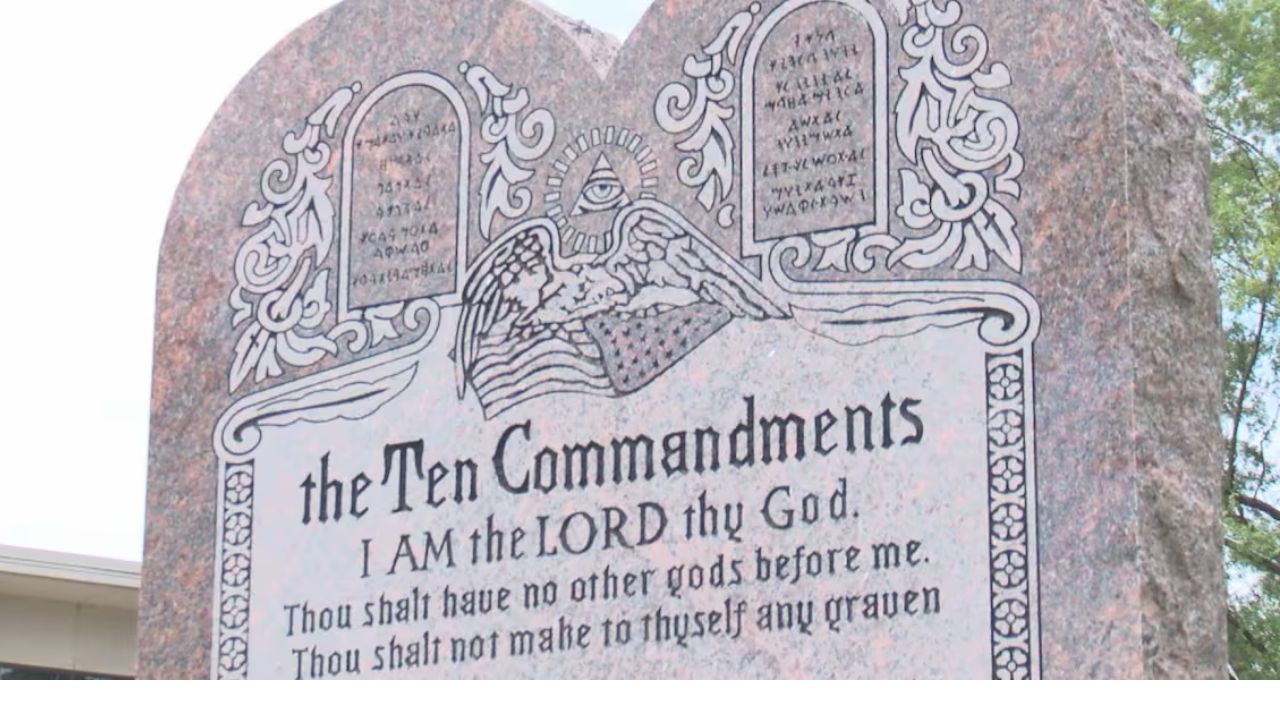Louisiana Ten Commandments Law: Know More Here
The GOP-dominated Legislature is pushing a conservative agenda under a new governor, and Louisiana is the first state to mandate that the Ten Commandments be displayed in every public school classroom.

Gov. Jeff Landry, a Republican, signed a bill into law on Wednesday mandating that all public classrooms, from kindergarten to state-funded institutions, display the Ten Commandments in “large, easily readable font” on posters.
The law’s opponents swore to challenge it in court and questioned its constitutionality. The measure’s supporters said that it has historical value in addition to being purely religious. The Ten Commandments are referred to in legalese as “foundational documents of our state and national government.”
The Ten Commandments “were a prominent part of American public education for almost three centuries,” according to a four-paragraph “context statement” that will accompany the posters. These must be in classrooms by the beginning of 2025.
The law prohibits using state funds for the mandate’s implementation. Donations would cover the cost of the posters.
Other items that the law “authorizes” but does not mandate are displayed in K–12 public schools: the Northwest Ordinance, which established a government in the Northwest Territory (modern-day Midwest) and paved the way for the admission of new states to the Union; the Mayflower Compact, which was signed by religious pilgrims aboard the Mayflower in 1620 and is frequently referred to as America’s “First Constitution”; and the Declaration of Independence.
Soon after the governor signed the bill into law at Lafayette’s Our Lady of Fatima Catholic School on Wednesday, civil rights organizations and groups opposed to government involvement in religion pledged to challenge the law.
The American Civil Liberties Union, Americans United for Separation of Church and State, and the Freedom from Religion Foundation said in a joint statement on Wednesday afternoon that the law will prevent students from receiving an equal education and will prevent children who hold different beliefs from feeling safe at school.
“The law violates the separation of church and state and is blatantly unconstitutional,” the groups said in a joint statement. “The First Amendment promises that we all get to decide for ourselves what religious beliefs, if any, to hold and practice, without pressure from the government. Politicians have no business imposing their preferred religious doctrine on students and families in public schools. “
State Senator Royce Duplessis stated in an April interview with CBS affiliate WWL-TV that he was against the bill.
“That’s why we have a separation of church and state,” said Duplessis, who is a Democrat. “We learned the 10 Commandments when we went to Sunday school. As I said on the Senate floor, if you want your kids to learn the Ten Commandments, you can take them to church.”
The contentious legislation passed in a Bible Belt state, coincides with a new phase of conservative leadership in Louisiana under Governor Landry, the Republican who took over for two terms in January and succeeded former Governor John Bel Edwards. With a supermajority in the legislature and representation in every state elected office, the Republicans are in a position to advance a conservative agenda.
The bill’s author is State House Representative Dodie Horton. She defended it in front of the House in April, stating that Louisiana’s laws are based on the Ten Commandments, according to WWL-TV.
“I hope and I pray that Louisiana is the first state to allow moral code to be placed back in the classrooms,” Horton said. “Since I was in kindergarten [at a private school], it was always on the wall. I learned there was a God, and I knew to honour him and his laws.”
In other states, including Texas, Oklahoma, and Utah, measures requiring the Ten Commandments to be exhibited in classrooms have been introduced. However, other than Louisiana, no state has been able to get the proposals into law despite threats of legal battles over the constitutionality of such policies.
There have long been legal disputes regarding the Ten Commandments’ presentation in classrooms.
A comparable Kentucky statute was declared illegal and in violation of the establishment clause of the U.S. Constitution in 1980 by the U.S. Supreme Court. This section states that Congress is not allowed to “make any law respecting an establishment of religion.” The Supreme Court determined that the law served a blatantly religious objective rather than any secular one.


Comments are closed, but trackbacks and pingbacks are open.